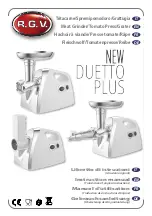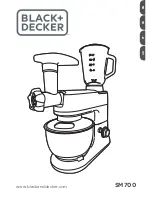
Document: DGP-3 & DGP-3-V2 Tungsten Grinder Product User Manual | Released: 5/13, Rev. A
Page 8
Electrode Grinding assembly cont’d
5. Left to right positioning: Adjust the position
of the electrode grinder assembly using the
horizontal adjustment know (Handle B) to place
beveled surface of the electrode guide collet
approximately 1/64” from the grinding surface.
6. Slip a tungsten electrode into and through the
electrode guide collet to determine where it will
contact the grinding disk surface.
7. Up and down positioning. Adjust the electrode
grinder assembly using the vertical adjustment
knob (Knob C) so that the tungsten electrode will
contact the actual grinding surface.
8. Remove the tungsten electrode from the electrode
guide collet.
9. Put the eyeshield in place and start the grinder.
Slide the tungsten electrode into and through
the electrode guide collet and twirl the electrode
(or the pin vise holding the electrode) slowly in
one direction between thumb and forefinger as it
approaches and makes contact with the grinding
surface. To retain maximum symmetry of the
point, try to keep from moving the electrode side
to side within the collet. The best technique for
this is to constantly lean the electrode against
the inside surface of the collet while turning.
Continue grinding until the desired sharpness
is obtained. Make sure to continue rotation as
the electrode is backed off from the wheel or a
spot may occur along the point.
Contamination
of the wheels can occur by using the diamond
grinding and cutting wheels as all-purpose shop
wheels. If you grind tools or other metal items,
other than electrodes, there is always the risk of
contaminating the wheels.
In addition to proper positioning and avoiding
contamination, use the recommended grinding
times in Table 1 below to increase the longevity of
the diamond grinding wheels. The wheel can be
used with very limited wear by working according
to these guidelines. Wear of the wheel will double
if the grinding time is reduced by one half using
more applied force and wear will triple if the time is
reduced by one third. Be patient and do not gouge the
wheel!
For users requiring extreme tolerances, a laser cut
tip/flat gauge is available from Diamond Ground
Products to accurately measure tip diameter. See
page 13 for the part number. Also note, a microscope
or comparator can be used to verify the angle (taper)
of the grind in a very precise and efficient manner.
Electrode Diameter
Electrode
Grinding
(In.)
Diameter (mm)
Time
.040”
1.0mm
5-8 sec
1/16”
1.6mm
11-15 sec
3/32”
2.4mm
15-20 sec
1/8”
3.2mm
25-35 sec
5/32”
4.0mm
30-40 sec
3/16”
4.8mm
55-65 sec
Table 1: Recommended grinding times for each diameter.
Consult Appendix A from Illustrated Parts
brochure and optional Accessories
Figure 1: Optimal location of electrode point contact area
Figure 2: Electrode grinding assembly































